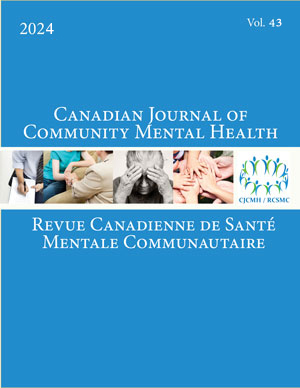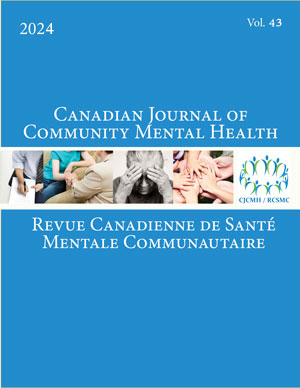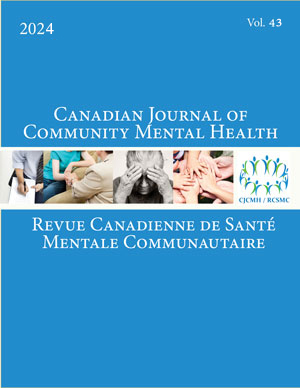Volume 40 • Number 3 • November 2021
Articles
OPEN ACCESS
Current research on well siblings of individuals with mental illness focuses predominantly on adult siblings of individuals with schizophrenia, eating disorders, and psychosis. Few studies examine the experiences of young adult siblings of individuals with mood and/or anxiety disorders. We conducted focus groups with 21 post-secondary students, gathering their experiences of living with a sibling with mood and/or anxiety disorders. Our findings highlight the important role well siblings play in their sibling’s care, and the significant health and social impacts of living with a mentally ill sibling, particularly during adolescence. The needs of young adult well siblings of individuals with mood and/or anxiety disorders must be considered in the provision of family-centred care.
OPEN ACCESS
Cet article présente les résultats d’une recherche dont l’objectif était de faire l’évaluation des retombées du Programme de Renforcement des Familles (PRF), implanté en 2011 dans deux quartiers défavorisés de la ville de Trois-Rivières. Cette recherche s’intéressait à savoir si l’expérience du PRF a permis aux familles y ayant participé de créer des liens entre elles et, plus globalement avec leur communauté. Les résultats découlant d’entretiens réalisés auprès de 20 parents et de 12 membres de la communauté donnent à réfléchir sur le pouvoir d’agir de ces familles de même que sur celui des intervenants qui les accompagnent.
OPEN ACCESS
We investigated the relationship between membership in an accredited Clubhouse for mental health support and psychiatric hospitalization in Canada using linked administrative data. Results show that Clubhouse members were less likely to be hospitalized after enrollment and after longer-term enrollment, and younger members diagnosed with schizophrenia and/or bipolar disorders were at increased risk of hospitalization compared to older members without such diagnoses. These findings provide evidence of the possible benefits of Clubhouses in Canada and the characteristics of members who may benefit from support.
OPEN ACCESS
Stigma associated with non-suicidal self-injury (NSSI), the deliberate damage of one’s body tissue for non-lethal reasons, is highly complex, far-reaching, and can have profound effects (e.g., shame, low self-esteem, thwarted help-seeking) on individuals with lived experience of NSSI. In concert with calls for greater inclusion of people with lived experience in NSSI research and advocacy, there are several robust and potentially impactful visual and digital research methods that directly involve individuals with lived experience, and which carry potential to tackle stigma. These methods, namely digital storytelling, photovoice, and participatory video, are largely underrepresented in contemporary NSSI research. Hence, the present commentary presents a concise overview of these methods and highlights their potential to address NSSI stigma.
OPEN ACCESS
This qualitative descriptive study aims to explore family members’ perceptions and experiences as a caregiver to older adults (>65 years) with depression. The findings revealed three key themes reflecting the experiences of caregivers, including “not the person I used to know,” “my life has changed,” and “stigma of depression.” Findings suggest caregiver education is needed to assist caregivers to understand depression, provide appropriate support and care, take care of their own health, maintain participation in valued activities, and minimize the impact of stigma. The study suggests future research to expand the inclusion criteria to depression and other comorbidities.
OPEN ACCESS
This brief report contains a summary version of the proposed action plan to modernize gender, sex, and sexual orientation (GSSO) information practices in Canadian electronic health record (EHR) systems. The plan was co-created by a research team with guidance from the Infoway Sex and Gender Working Group, organizations and communities involved with sexual and gender minorities (SGM), and those with lived and living experiences as SGM. The plan describes seven high level actions needed to improve the principles, approaches, policies, and processes of defining, collecting, organizing, sharing, and using GSSO information in EHRs.
Practice Innovations
OPEN ACCESS
The context of the Covid-19 pandemic has affected service programming and delivery around the world. In Canada, it changed how mental health and other services continued to support their clients. This article describes how four services adapted by summarizing innovative practices that took place. Implications and future directions are provided.
OPEN ACCESS
The Centre of Excellence on PTSD (the Centre) is a new Canadian intermediary established in part to support the uptake of evidence-based practices among service providers treating veterans. Given the unique and complex landscape for veteran mental health service delivery, the Centre is developing networks and prioritizing co-design to address anticipated implementation challenges.










